The Brussels parliament has approved stronger energy efficiency regulations for housing in the capital. By 2033, energy-intensive houses (EPC codes F and G) must be renovated, along with improvements made to EPC D and E houses by 2045 to phase them out.
MPs approved changes to the Brussels Air Climate Energy Code, aligning it with the region’s building energy renovation strategy.
Minister for Climate Transition Alain Maron (Ecolo) highlights that these steps are a means of stepping up efforts towards a 47% reduction in greenhouse gas emissions by 2030, in line with European objectives.
Under these changes, all Brussels residences must have a Building Energy Performance (PEB) certificate by 2030. Failure to obtain a valid certificate may lead to an environmental infraction, punishable by up to a €100,000 fine and a potential two-year prison sentence.
Currently, Brussels buildings contribute to over half of the region’s greenhouse gas emissions and nearly a third of fine particle air pollution. 27% of Brussels households face energy insecurity, whilst a third of the capital’s buildings lack insulation.
According to Maron, this legislation is in line with the 2023 Air Climate Energy Plan and aims to steer Brussels’ buildings towards long-term sustainability.
However, the legislation faced criticism from liberal and N-VA opposition regarding the absence of resources and funding to achieve these goals. The PTB party criticised the punitive aspect of the legislation, suggesting that it could disadvantage the most vulnerable.

